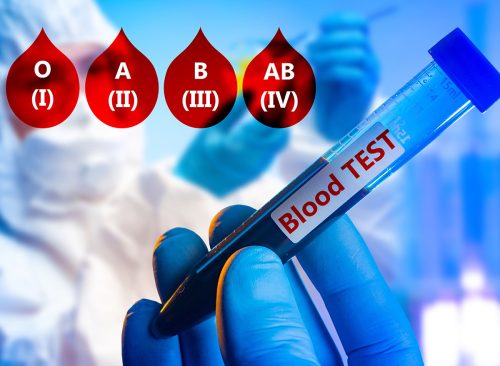These 7 Factors Put You at Risk for Dementia
People with a certain blood type are at greater risk.

The progressive brain disorder known as dementia is unfortunately becoming more common. That’s simply because the number one risk factor is advancing age, and more of us are living longer. But there are things you can do to lower your risk of cognitive decline and dementia. The first step is being aware if you have higher odds of developing the disease. Research has found that people with a certain blood type are at greater risk.
1
This Blood Type Poses Highest Risk

According to a study published in the journal Neurology, people with blood type AB are 82 percent more likely to develop thinking and memory problems that can lead to dementia than people with other blood types.
The potential culprit: Factor VII, a protein that helps blood to clot. People with AB blood have a higher average level of factor VII than people with other blood types, and high levels of factor VII are associated with a higher risk of dementia.
2
The Delicate Balance of Factor VII

Factor VII makes blood “stickier” or more likely to clot. Having too little Factor VII means blood doesn’t clot effectively; that’s the case in people with hemophilia. But having too much is dangerous too—blood that clots too easily can lead to heart attack and stroke.
3
Don’t Panic About Blood Type

However, experts have said that people with type AB blood shouldn’t be overly worried; there are bigger risks for dementia than blood type—such as obesity and smoking—and the Neurology study was small and has yet to be confirmed by more extensive research.
4
Other Risks of Type AB Blood

Having blood type AB is rare. In fact, it is the least common blood type in the U.S. Only about 4 percent of Americans have type AB blood.
Type AB blood has been shown to carry a higher risk of stomach and pancreatic cancer. AB blood has also been linked to a higher risk of symptomatic and severe COVID-19. Northwestern Medicine advises that if you have type AB blood, you should emphasize cancer-fighting foods, such as fruits and vegetables, in your diet.
5
What Is Dementia?

Dementia is a category of brain disorders that involve changes to memory, thinking, personality, and judgment. Ultimately, these changes interfere with a person’s ability to function independently. Most cases of dementia are diagnosed in people older than 65. Alzheimer’s disease is the most common form of dementia, affecting about 6.2 million Americans.
RELATED: 90% of People Who Die From COVID Have This in Common
6
Other Risks for Dementia

Experts aren’t sure why some older people develop dementia and others don’t. The major risk factors for dementia include: Age; A family history of dementia; An unhealthy lifestyle (poor diet, lack of exercise, smoking, excessive alcohol use, obesity); Cardiovascular disease; Head injury; Social isolation or a lack of cognitive engagement.














